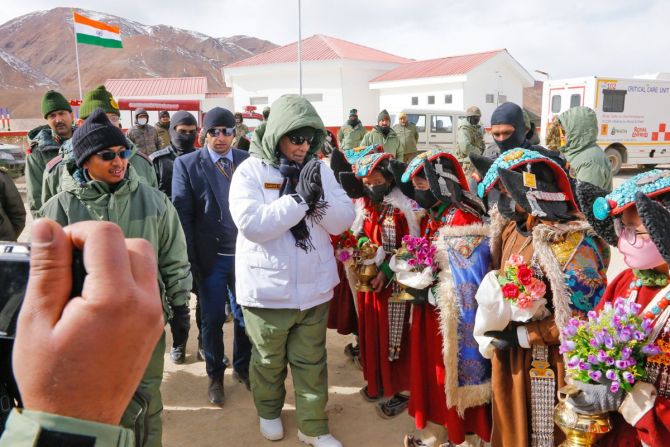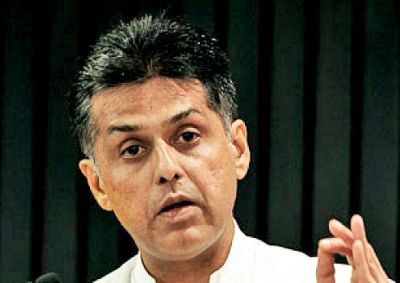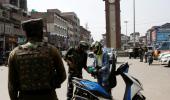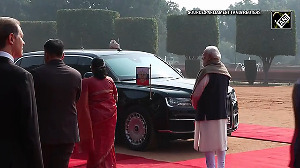'We have not had one discussion on the border incursions or the subsequent report of the building of Chinese villages on Indian territory in Arunachal Pradesh.'

Manish Tiwari, a member of Parliament in his latest book Ten Flashpoints; 20 Years National Security Situations That Impacted India looks at some key security situations that have impacted India and then goes on to examine India's responses to it.
"There is a big gap in our institutional knowledge as far as China is concerned. I don't think a mere China desk in the MEA is able to do justice to that vast country," he tells Rediff.com's Senior Contributor Rashme Sehgal. The first party of an exclusive two-part interview:
Your book has highlighted the uncanny parallel between the Pakistan occupying a large tract of Indian territory in 1999 and the Chinese incursion in Ladakh in 2020.
And then again the parallels between the attack on Parliament in 2001 and the attack on Mumbai in 2008.
Our intelligence agencies seem to be caught napping repeatedly. Why is that?
Interestingly, today I have moved a private member's Bill in Parliament to regulate the functioning of our intelligence agencies and to provide for Parliamentary oversight.
I had moved this bill in 2011, but it lapsed because I had moved to government.
I have reinforced it as of today. The question you ask is absolutely relevant because in 1999, the Pakistanis had moved across a broad frontage that was 160 kilometres wide and nine kilometers in depth in Ladakh.
It went undetected. We were not able to pick it up.
It was a massive intrusion. The Kargil Review Committee was very scathing in its indictment of the intelligence failure.
Dr (Krishnaswamy) Subrahmanyam (External Affairs Minister Dr S Jaishankar's father), who headed the Kargil Review Committee, made substantive recommendations which were later on picked up by the Group of Ministers who were supposed to act on these recommendations.
But obviously there is a gap between what was recommended and institutional learning because ultimately the same thing happened in April 2020 when the Chinese came into Ladakh in multiple points.
We only came to know once they had come and sat down on our side of the line of actual control.
This begs the question is what has been our learning in the last 21 years.
What do you feel?
There is a very siloised approach within our intelligence structures.
There is not enough sharing of the intelligence information. There is also a problem with the analysis of information.
These have not been surmounted. Even with 26/11, there was enough actionable intelligence in the public domain.
But this was not acted upon and it therefore resulted in those horrendous massacres.
We need someone to look at our intelligence paradigm and come to the bottom of why such glaring omissions have taken place.
Given our past history of repeated omissions and our inability to destroy the architecture of terror created by Pakistan's deep state, has some kind of defeatist mindset set in with our security apparatus?
I don't think it is a defeatist mindset, but the fact is that you are dealing with an adversary who has no compunctions about being as ruthless as is required to achieve his objective.
They possess a nimbleness which is missing in us.
There is open source information available about various security grids that have been put in place in J&K, these grids are efficacious.
But what we saw playing itself out only last month was this extended encounter in Poonch in which we lost 11 of our army personnel while the infiltrators are still untraced.
Given the magnitude of the challenge, there is something amiss, there is a gap which has not been addressed.

If we look at Pathankot, Uri, Pulwama, we are bleeding and we continue to bleed.
Following our talks with the Chinese PLA over the Ladakh incursions, as part of the disengagement process, the army did not want to give up the Kailash heights and yet the political dispensation insisted that it be given up.
So we lost a very strategic point and got nothing in return?
The government has been stonewalling any discussion on the Chinese incursion for the past 18 months.
We have not had one discussion on the border incursions or the subsequent report of the building of Chinese villages on Indian territory in Arunachal Pradesh.
We continue to have problems with China over the boundary issue.
But if we look at China, it has settled its land boundary disputes with all its land neighbours.
The only countries with which it continues to have land boundary disputes are with India and Bhutan but they are in the process of settling their dispute with Bhutan.
This would leave India with whom it has an open dispute that goes back to prior to Independence.
Why is this so? I don't think the Indian State across different dispensations has a very accurate understanding of the Chinese mind.
How many think-tanks and top of the line research institutes are studying China? The numbers are completely negligible.
We need to look at their ethos, their military core structures, what exactly are they doing in technology and their leadership structures.
There is a big gap in our institutional knowledge as far as China is concerned.
I don't think a mere China desk in the MEA is able to do justice to that vast country.
What do you feel about the boundary dispute. Has it been triggered because India was attempting to project itself as a major power alongside China?
The settlement of a boundary dispute requires give and take, but given the present polarised atmosphere prevailing in the country, we seem to have no consensus on any issue.
No one is willing to walk that extra mile and do what is required.
In the case of Bangladesh, whatever boundary disputes were there, they were effectively settled.
We swapped territory and we arrived at an agreement.
According to me, the reason why we have not been able to break out of our neighbourbood is because we continue to be bogged down by the baggage of history.
If we ever move towards a border settlement with China, we will have to do a give and take with them.
Feature Presentation: Aslam Hunani/Rediff.com










